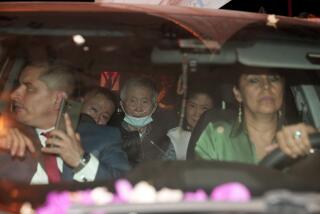Questions About Fujimori’s Birth Unsettle Nation
- Share via
BUENOS AIRES — After crescendoing for months, Peru’s political crisis quieted temporarily this week with the traditional state-of-the-nation address by President Alberto Fujimori.
The lull allowed Peruvians to reflect on the president’s speech on July 28, Peru’s Independence Day and, according to the government, Fujimori’s 59th birthday. The speech was remarkable chiefly for the things the president did not say.
Fujimori did not announce whether he will seek an unprecedented third term. He did not mention the chiefs of the intelligence service and the military, who are under fire because of alleged corruption. And Fujimori did not address explosive allegations challenging the official assertion that he was born in Peru in 1938.
The country’s press has revived questions about whether Fujimori--whose Japanese immigrant heritage lies at the heart of his underdog political myth--is Peruvian-born and therefore constitutionally entitled to be president. The repercussions could threaten his right to govern and the stability of a shaky democracy.
“The delicate issue of the nationality of the chief of state has not been completely clarified,” the respected daily El Comercio said in an editorial this week. “Given the political dimensions . . . it would be important for the president himself to speak out.”
The birthplace dispute erupted and faded inconclusively during the racially tinged backlash to Fujimori’s against-all-odds conquest of the presidency in 1990. The doubts arose again after the government last month stripped Baruch Ivcher, the Israeli-born owner of a television station, of his Peruvian nationality. Ivcher asserts that he was targeted because his channel exposed killings and corruption linked to government security forces.
Last week, the magazine Caretas published an article about reputed irregularities in documents connected to the president’s birth. The birthplace on his baptismal certificate was visibly altered, the magazine asserted. An immigration document, Caretas said, shows that Fujimori’s mother stated she had two children when she arrived from Japan in 1934. (Fujimori is the second of five children.)
Calling for an investigation, the magazine quoted the claim of a former Fujimori campaign manager who said that the powerful presidential intelligence advisor, Vladimiro Montesinos, once told him that Fujimori “is not Peruvian, and that is dangerous.”
This stoked speculation that Montesinos holds sensitive information on the president, enabling the advisor to survive scandals such as the recent charge that the espionage service tapped the phones of scores of journalists and political figures.
Still, no one has produced proof--such as Japanese government records--that Fujimori was not born in Peru. If the allegation is true, the president would have to be at least four years older than he claims. His lawyer assured journalists that the matter will be fully clarified.
Meanwhile, the debate deepened the sense of turmoil in a nation where the military has not been shy about demonstrating its power.
Fujimori pointedly declared during his speech this week that he remains firmly in command of the armed forces. He added: “My commitment to the defense of liberty of expression and the defense of human rights is total.”
He also announced raises for public employees, tax cuts and new credit opportunities. He seemed to appeal to voters’ pocketbooks as a way of downplaying his confrontation with the loud but largely disorganized opposition, analysts said.
The crisis could flare again, said analyst Santiago Pedraglio, because of public concerns about the influence of the military and intelligence service and about efforts to change the law and enable a third presidential term in 2000.
“Fujimori tried to avoid political themes,” Pedraglio said. “All of those issues are somehow related to the military brass and the intelligence service. The sources of the crisis are intact because Fujimori has not deactivated them.”
Times special correspondent Mariana Sanchez Aizcorbe in Lima, Peru, contributed to this report.
More to Read
Sign up for Essential California
The most important California stories and recommendations in your inbox every morning.
You may occasionally receive promotional content from the Los Angeles Times.










